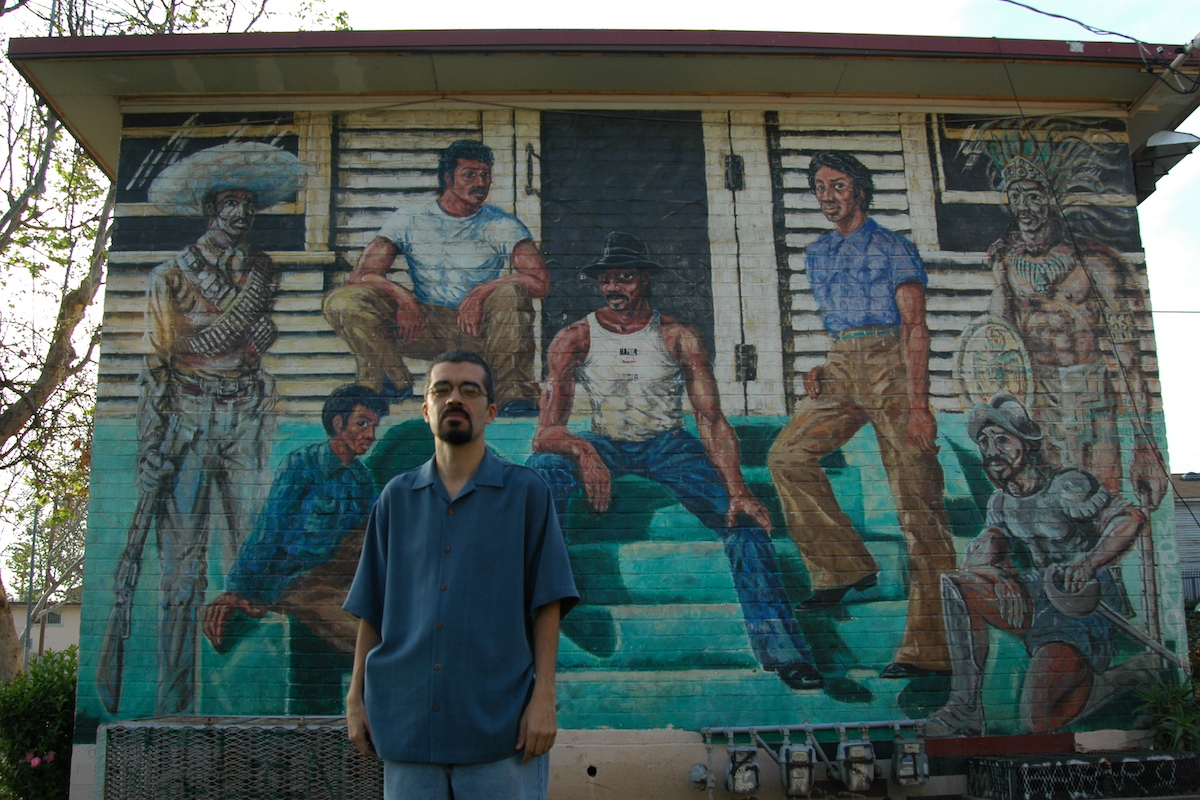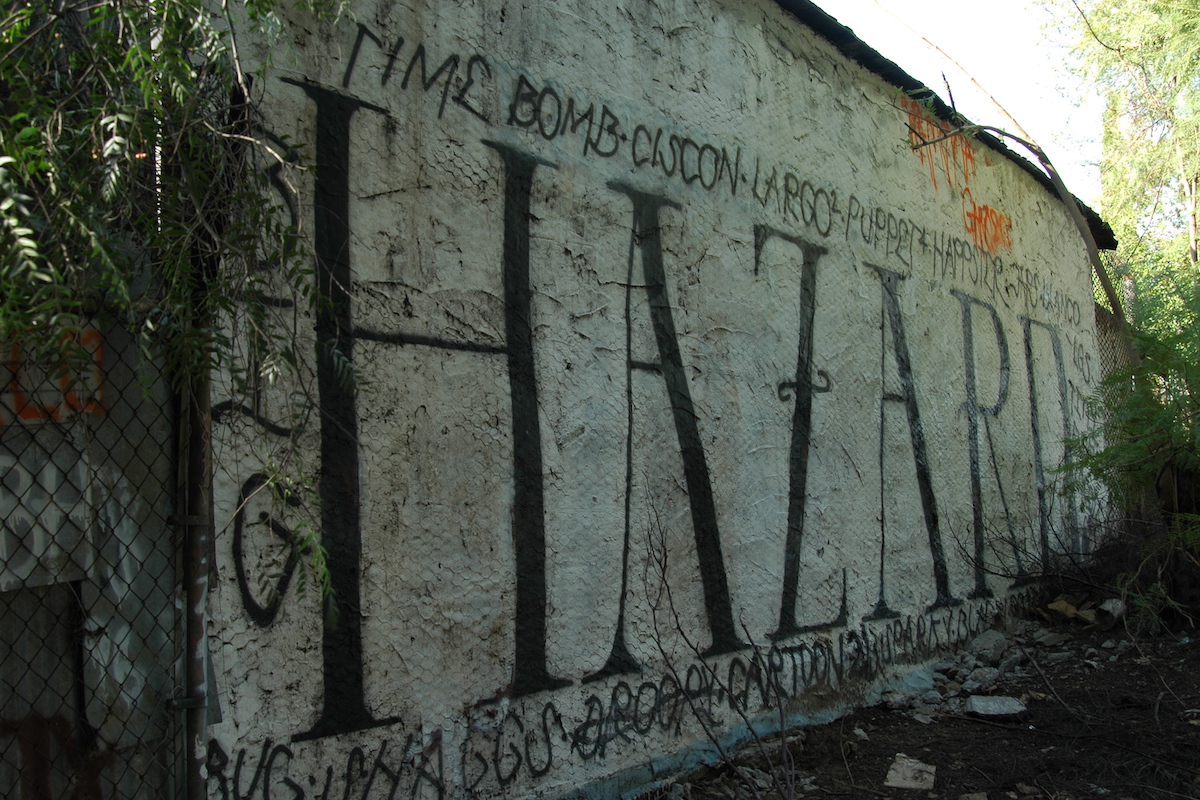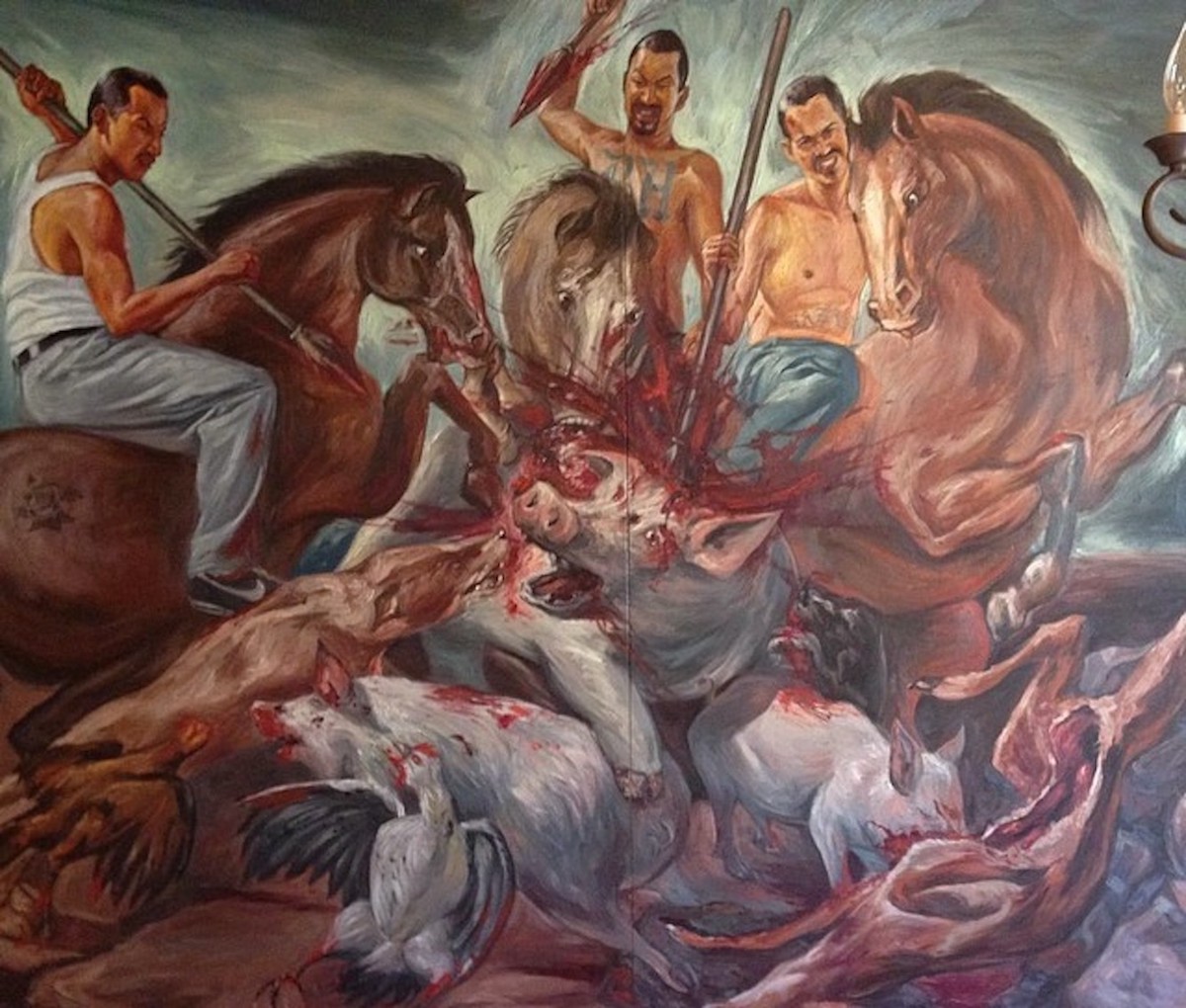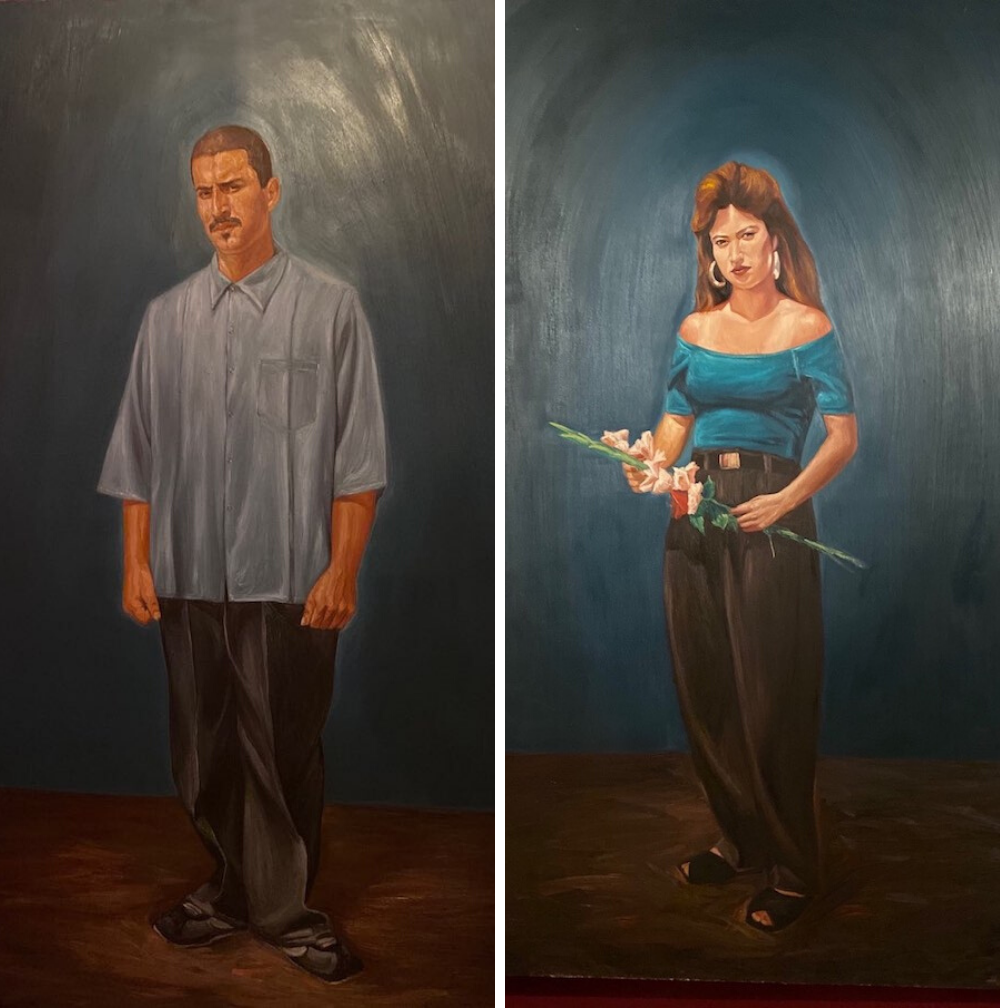

Alvaro Huerta in front of the mural at Ramona Gardens (Photo by Pablo Aguilar, 2005)
Editor’s Note: An earlier version of this essay was published by LA Taco. The author granted us persmission to publish his work here.
Nietzsche warned me about gazing too long into the abyss, but I didn’t listen. It gazed back into me.
After spending my early years with extended family in Tijuana (Baja California) and Hollywood (Alta California), I spent my formative years with my immediate family in East Los Angeles’ notorious Ramona Gardens public housing project—better known as the Big Hazard projects, named after the dominant gang.
During the over 10 years that we lived there, it was considered one of the most dangerous neighborhoods in the country. From gangs to drugs, from police abuse to housing authority harassment, from drive-by shootings to death, from high school drop-outs (or push-outs) to chronicle unemployment, from abject poverty to welfare, if you weren’t raised in the projects and witnessed/experienced its darkness, just “sit down” —to quote the street philosopher/rapper, Kendrick Lamar— and listen.
https://www.youtube.com/watch?v=J2hg_d-spwo
Welcome to the Hood
If you’re white and move into the lily-white suburbs, you’ll be cordially greeted with a “hello neighbor” and given a beautiful basket of fresh fruits, gourmet cheeses and crackers. In the case of my brother Salomon (the critically acclaimed artist) and I, when moving into the projects, we were “warmly” greeted by a bunch of Chicano kids, seeking to officially induct us into the neighborhood with arranged fights. Fortunately, as an 8-year-old, Salomon performed his best Bruce Lee kung fu moves, where his opponent quit without throwing a punch. When it was my turn, as a 6-year-old, I simply mimicked my brother and raised my arms in victory. As we were welcomed into the neighborhood, we learned a hard lesson with this rite of passage: to survive in the projects, you must be able to defend yourself. While I don’t expect outsiders to understand, I’m also indifferent to those who don’t want to learn.
‘The Christians Are Coming!’
I will never forget the summer when the white, born-again Christians arrived in their buses into the projects to “save” us—poor, Catholic Mexican kids. To lure the neighborhood kids, they enticed us with free field trips, money and food. These outsiders didn’t ask permission from our parents. They just took us. As a 10-year-old, I couldn’t resist all of the free goodies. Once on the bus, I recall singing Christian songs, where the white escorts gave dollar bills to the best singers, as if we were strip joint dancers. One hour later, we arrived at a large auditorium with an all-you-can-eat buffet. I loved the desserts, especially the chocolate cake with white frosting. After lunch, the blond, blue-eyed preacher delivered a sermon, which I didn’t understand one word. He then told us —between 50 to 75 brown kids— to go into a room in small groups. Once there, they instructed us to take off all our clothes and put on blue plastic gowns, similar to hospital patient gowns. In a single-file line, they then led us inside a large pool, where, one by one we were fully dunked into the water and baptized by the preacher. On our way back to the projects, I didn’t feel born again. I just had an upset stomach for eating too much cake!


Hazard graffiti in Ramona Gardens (By Pablo Aguilar, 2005)
Don’t Inhale
While former presidents Bill Clinton and Barack Obama inhaled marijuana during their youth, when I was first offered to smoke at 11 years old, I didn’t. On a hot summer night, I was playing basketball at the gym, when one of my childhood friends asked me (more like told me) to follow him outside to meetup with his older brother. I originally thought I was going to get jumped since his brother was in the gang. While I didn’t show any fear, adhering to the norms of the mean streets, I was happily surprised that they actually invited me to smoke. Offering sage advice, my friend said, “When you inhale, hold your breath so it gets into your lungs!” I quickly recalled viewing a movie at Murchison Elementary School, where smoking cigarettes caused black lungs. While pretending to smoke, they got high. Ten minutes later, I returned to the gym to shoot hoops. Given the prison-like conditions we lived under, where we were treated by the government like wards of the state, temporarily escaping reality makes life bearable.
Protectors or Oppressors?
In the lily-white suburbs, the cops live up to their motto of “To protect and to serve.” In the projects, they behave more like an occupation force in a foreign country. As poor, brown kids from the projects, when approached by the cops, we knew the drills. When walking, stop immediately, get on knees and put hands behind your head. When standing near a wall or building, turn around, spread legs and put hands against the wall. When driving, turn off the engine, put hands on the steering wheel and don’t talk back. “Yes, officer! No, officer!” While teaching myself how to drive my ’67 Mustang (a gift from my sister Catalina) as a 16-year-old, I was pulled over by the cops. The driver got out of his car, yelled instructions and pointed his gun directly at me. My crime: making a rolling stop! One wrong move on my part, like demanding my civil rights, and I could’ve been killed.


“Los Tres Caballeros,” by Salomon Huerta, 1992
The Shame of Poverty
There’s nothing romantic or noble about being poor, despite what Gandhi preached and practiced. When my mother Carmen —a domestic worker for our 40 years— sent me to La Paloma Market, I was always embarrassed to use food stamps. Back then, they came in a booklet with Monopoly-looking money to purchase groceries. (Now, the government issues EBT cards.) In retrospect, I shouldn’t have been embarrassed since everyone in the projects was on food stamps and welfare. Speaking of being embarrassed, when my childhood best friend and I visited the amusement park Six Flags Magic Mountain in our teens, we agreed to say that we lived next to General Hospital, if we met anyone. It was like the scene in La Bamba (1984) when Ritchie Valens was ashamed to tell his white girlfriend Donna where he lived—a barrio in Pacoima.
From the Eastside to the Westside
Since leaving and abandoning my family and homeboys to purse a degree in mathematics at UCLA, as a 17-year-old freshman, I grew to appreciate where I came from. Whenever I mention that I was raised in the projects in East Los Angeles, people usually ask me, “How come you never joined a gang?” With a straight face, I quickly reply: “Actually, I submitted my gang application, but it was rejected because I was too thin to defend the neighborhood!” Jokes aside, if I had the fearless mentality and physical attributes of many of my childhood friends, where they joined the gang, instead of spending all those years at UCLA (B.A., M.A.) and UC Berkeley (Ph.D.), I would’ve been doing time at Folsom and San Quentin. While I don’t romanticize gangs, I also don’t cast judgment on my childhood homeboys, where the odds were against us from the start. For me, it helped that I excelled in mathematics, where, like my brother Salomon who studied (and mastered) art at ArtCenter College of Design (B.F.A.) and UCLA (M.F.A), my special skill was my ticket out of the projects. I only wish that everyone else from the projects had (and has) the same opportunities to pursue higher education to succeed.


(L) “Untitled” homeboy by Salomon Huerta, 1992; (R) “Untitled” homegirl by Salomon Huerta,1992
Postscript
When we analyze the plight of the marginalized in the projects, let’s not blame the victims. Instead, let’s put the blame of their bleak conditions on a capitalist society that houses brown (and black) bodies in oppressive environments with bleak and traumatic outcomes. American society —past and present— has neither been fair nor just to brown people. Structural racism. Racial segregation. Divide and conquer. Police abuse. Concentrated poverty. State surveillance. ¡Ya basta! If we, as a nation, invest in these communities —our communities!— like “we” do to perpetuate the military-industrial complex, which profits from endless wars, we would immediately end the despair and hopelessness of los de abajo in America’s barrios.
***
Dr. Alvaro Huerta holds a joint faculty appointment in Urban & Regional Planning and Ethnic & Women’s Studies at California State Polytechnic University, Pomona. Among other publications, he’s the author of Defending Latina/o Immigrant Communities: The Xenophobic Era of Trump and Beyond. He holds a Ph.D. (city and regional planning) from UC Berkeley. He also holds an M.A. (urban planning) and a B.A. (history) from UCLA.



and the parents had no blame?
Great piece. I met the author’s brother, Ismael “Mayo” Huerta, my Freshman year in HS.
@Barbara Razza white society is to blame they are the destroyers of good and don’t look at themselves or demonize their own like the kkk right